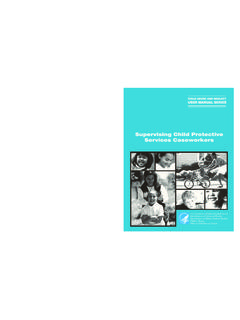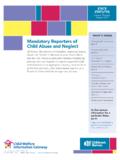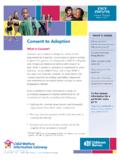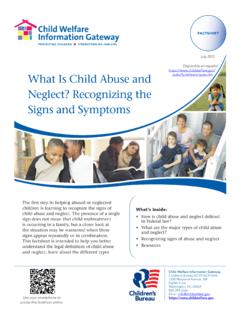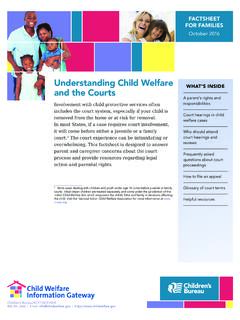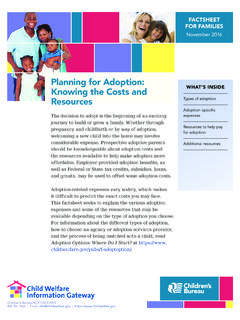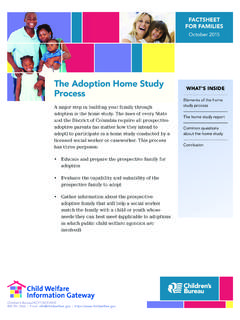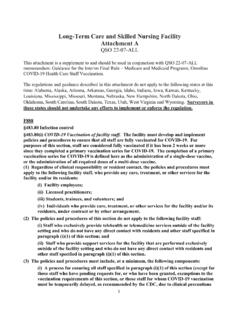Transcription of Placement of Children With Relatives - Child Welfare
1 STATE. STATUTES. Current Through January 2018. WHAT'S INSIDE. Placement of Children With Giving preference to Relatives for out-of-home Relatives placements When a Child is removed from the home and placed Approving relative in out-of-home care, Relatives are the preferred placements resource because this Placement type maintains the Child 's connections with his or her family. In fact, in Placement of siblings order for states to receive federal payments for foster care and adoption assistance, federal law under title Adoption by Relatives IV-E of the Social Security Act requires that they Summaries of state laws consider giving preference to an adult relative over a nonrelated caregiver when determining a Placement for a Child , provided that the relative caregiver meets all relevant state Child protection standards.
2 1 Title To find statute IV-E further requires all states2 operating a title information for a particular state, IV-E program to exercise due diligence to identify go to and provide notice to all grandparents, all parents of a sibling of the Child , where such parent has legal custody of the sibling, and other adult Relatives of the gov/topics/systemwide/. laws-policies/state/. Child (including any other adult Relatives suggested by the parents) that (1) the Child has been or is being removed from the custody of his or her parents, (2). the options the relative has to participate in the care and Placement of the Child , and (3) the requirements to become a foster parent to the 1.
3 42 671(a)(19) (LexisNexis 2017). Placement refers to the placing of a Child in the home of an individual other than a parent or guardian or in a facility other than a youth services center. 2. The term state as used in this document includes the District of Columbia, Puerto Rico, the Virgin Islands, Guam, and American Samoa (42 C. 410(h) (LexisNexis 2017)). All, with the exception of Guam and American Samoa are approved to operate the title IV-E. Foster Care and Adoption Assistance Program and are subject to the requirements of title IV-E of the Social Security Act.
4 This document does not include references to any tribal code. 3. 42 671(a)(29) (LexisNexis 2017), as amended by the Fostering Connections to Success and Increasing Adoptions Act of 2008. Children 's Bureau/ACYF/ACF/HHS. | Email: | Placement of Children With Relatives Title IV-E of the Social Security Act provides to states suitable Placement resource for the Other Relatives federal reimbursement for a part of the cost of providing that may be considered for Placement of the Child include foster care, adoption assistance, and kinship guardianship great-grandparents, aunts, uncles, adult siblings, cousins, or the parent of the Child 's sibling.
5 For Indian Children , assistance on behalf of each Child who meets federal 11 states have statutes specifically allowing members of eligibility criteria (as described in 42 672 and 673).4. an Indian Child 's tribe to be considered extended family These reimbursements are available to public agencies members for Placement in all 50 states, the District of Columbia, and Puerto Rico as well as to any Indian tribe, tribal organization, or tribal In 28 states, the District of Columbia, and Guam, when consortium operating an approved program to provide a suitable relative cannot be found, the agency may foster care maintenance payments, adoption assistance, consider placing the Child with fictive kin.
6 10 The term fictive kin refers to a person who is not related to the and, at the agency's option, a guardianship assistance Child by blood, marriage, or adoption but who is known to the family, has a substantial and positive relationship with the Child , and is willing and able to provide a suitable Giving Preference to Relatives for Out- home for the Child . Examples of fictive kin caregivers of-Home Placements can include the adoptive parent of the Child 's sibling, a nonrelated godparent, a close family friend, a neighbor, a For this publication, statutes have been collected across clergy member, or other adult who has a close and caring all states, the District of Columbia, American Samoa, relationship with the Child .
7 Guam, the Northern Mariana Islands, Puerto Rico, and the Virgin Islands that describe the specific requirements While all title IV-E programs must exercise due diligence for giving preference to a suitable relative when a to identify and provide notice to Relatives , 26 states and Child is in need of out-of-home care, and an analysis of Guam utilize statutes and regulations to require social the information collected informs the discussion that services agencies to exercise due diligence in identifying This analysis indicates that each state defines and locating a Child 's relative when out-of-home relative somewhat differently, including Relatives by Placement is The steps that need to be taken blood, marriage, or adoption ranging from the first to the include: fifth degree.
8 While all title IV-E programs must consider giving preference to relative placements, approximately Requiring the Child 's parent to provide a list of the 48 states, the District of Columbia, Guam, and Puerto names, addresses, and telephone numbers of every Rico include this language in their Of the grandparent and other adult Relatives of the Child agencies that address these requirements via statutes or regulations, preference for Placement is given to the Child 's 8. arizona , Arkansas, Colorado, Florida, Montana, New York, North Carolina, grandparents, although 12 states require that agencies Ohio, Pennsylvania, Utah, Vermont, and Wyoming.
9 9. Alaska, Minnesota, Missouri, Nebraska, New Mexico, North Carolina, must first determine whether a noncustodial parent is a Oklahoma, Oregon, Pennsylvania, Utah, and Washington. Under the federal Indian Child Welfare Act (ICWA), the term extended family member is defined by the law or custom of the Indian Child 's tribe or, in the absence of such law or custom, is a person who is at least age 18 and who is the Indian 4. See Child Welfare : An Overview of Federal Programs and Their Current Child 's grandparent, aunt or uncle, brother or sister, brother-in-law or sister- Funding (2017), from the Congressional Research Service at in-law, niece or nephew, first or second cousin, or stepparent.
10 (See 25 crs/ (1,200 KB). 1903(2) (LexisNexis 2017)). ICWA also addresses Placement preferences for 5. See Title IV-E Foster Care (2012), from the Children 's Bureau at https://www. Children meting the definition of an Indian Child . 10. Alaska, Arkansas, Connecticut, Florida, Georgia, Hawaii, Idaho, Illinois, 6. This analysis is limited to statutes and regulation. States also can implement Indiana, Kansas, Kentucky, Louisiana, Massachusetts, Minnesota, Missouri, the title IV-E requirements through policy or procedure. Nevada, New Jersey, New York, North Carolina, North Dakota, Ohio, Oregon, 7.
